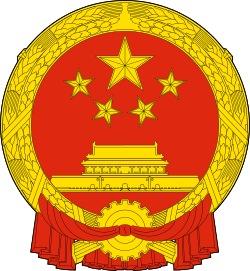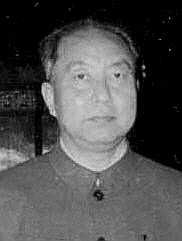Premier of the People's Republic of China
| Premier of the State Council of the People's Republic of China 中华人民共和国国务院总理 | |
|---|---|
|
Emblem of the People's Republic of China | |
| Residence | Zhongnanhai |
| Nominator | the President of the People's Republic of China |
| Appointer | the National People's Congress |
| Term length |
five years, renewable once consecutively |
| Inaugural holder | Zhou Enlai |
| Formation |
27 September 1954 (60 years, 214 days) |
| Website | State Council |
| Premier of the State Council of the People's Republic of China | |||||||
| Simplified Chinese | 中华人民共和国国务院总理 | ||||||
|---|---|---|---|---|---|---|---|
| Traditional Chinese | 中華人民共和國國務院總理 | ||||||
| |||||||
| Alternative Chinese name | |||||||
| Simplified Chinese | 国务院总理 | ||||||
| Traditional Chinese | 國務院總理 | ||||||
| Literal meaning | State Council Premier | ||||||
| |||||||
 |
| This article is part of a series on the politics and government of China |
|
Current leadership
|
|
|
|
|
|
|
|
|
Politics portal |
The Premier of the State Council of the People's Republic of China, sometimes also referred to informally as the "Prime Minister", is the Leader of the State Council of China (the "Central People's Government" after 1954), who is the head of government and holds the highest rank (Level 1) in the Civil Service. This position was originally known as Premier of the Government Administration Council of the Central People's Government (Chinese: 中央人民政府政务院总理) and changed to its current name in 1954.
The Premier is formally approved by the National People's Congress upon the nomination of the President. In practice, the candidate is chosen through an informal process within the Communist Party of China. Both the President and the Premier are selected once every five years. The Premier has always been a member of the powerful Politburo Standing Committee of the Communist Party of China.
Powers and duties
The Premier is the highest administrative position in the Government of the People's Republic of China. The Premier is responsible for organizing and administering the Chinese civil bureaucracy. For example the Premier is tasked with planning and implementing national economic, social development and the state budget.[1] This includes overseeing the various ministries, departments, commissions and statutory agencies and announcing their candidacies to the National People's Congress for Vice-Premiers, State Councillors and ministerial offices. The Premier's powers and responsibilities are codified into the constitution unlike the Prime Minister from the Westminster system as by convention or traditions.[1]
The Premier does not have command authority over the People's Liberation Army, but the Premier is the head of the National Defense Mobilization Commission of China and deputy head of the National Security Commission which are departments of the armed forces. Since 1980s, there has been a division of responsibilities between the Premier and the General Secretary of the Communist Party wherein the Premier is responsible for the technical details of implementing government policy while the General Secretary gathers the political support necessary for government policy.
In 1989, then Premier Li Peng, in cooperation with the then Chairman of the Central Military Commission Deng Xiaoping, was able to use the office of the Premier to declare martial law in Beijing and order the military crackdown of the Tiananmen Square protests of 1989.
The Premier has been supported by four Vice-Premiers since Deng Xiaoping's reform in 1983. The First-ranked Vice Premier will act in the premier's capacity in their absence.
List of premiers
-

1st — Zhou Enlai
(served: 1949–1976) -

2nd — Hua Guofeng
(served: 1976–1980) -
.jpg)
3rd — Zhao Ziyang
(served: 1980–1988) -

4th — Li Peng
(served: 1988–1998) -

5th — Zhu Rongji
(served: 1998–2003) -
.jpg)
6th — Wen Jiabao
(served: 2003–2013) -
.jpg)
7th — Li Keqiang
(served: 2013–present)


Living former premiers
As of April 2015, there are three living former premiers:
| Premier | Term of office | Date of birth |
|---|---|---|
| Li Peng | 1987-1998 | 20 October 1928 |
| Zhu Rongji | 1998-2003 | 1 October 1928 |
| Wen Jiabao | 2003-2013 | 15 September 1942 |
Premier's spouse
Since the first premier, seven had a spouse during term of office.
| № | Spouse | Premier | Tenure |
|---|---|---|---|
| 1 | Deng Yingchao | Zhou Enlai | 1 October 1949 – 8 January 1976 |
| 2 | Han Zhijun | Hua Guofeng | 4 February 1976 – 10 September 1980 |
| 3 | Liang Boqi | Zhao Ziyang | 10 September 1980 – 24 November 1987 |
| 4 | Zhu Lin | Li Peng | 24 November 1987 – 17 March 1998 |
| 5 | Lao An | Zhu Rongji | 17 March 1998 – 16 March 2003 |
| 6 | Zhang Peili | Wen Jiabao | 16 March 2003 – 15 March 2013 |
| 7 | Cheng Hong | Li Keqiang | 15 March 2013 – present |
References
- ↑ 1.0 1.1 http://english.people.com.cn/constitution/constitution.html, Section 3, Article 88 and Article 89.
External links
See also
- List of premiers of China
- List of leaders of the People's Republic of China
- Vice Premier of the People's Republic of China
- President of the People's Republic of China
- Prime Minister of China (disambiguation)
- List of Chinese leaders
- Paramount Leader
- Political position ranking of PRC
| ||||||||||||||||
| ||||||||||||||||||||||||||||||||||||||||||||||||||||
| ||||||||||||||||||||||||||||||||||||||||
